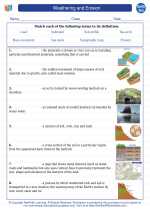Pollution
Pollution refers to the introduction of harmful substances or contaminants into the environment, causing adverse effects. It can occur in various forms and affect different elements of the environment, including air, water, and soil.
Types of Pollution
Air Pollution: This type of pollution occurs when harmful chemicals or particulate matter are released into the atmosphere, often from industrial processes, vehicle emissions, or natural sources such as wildfires. It can lead to respiratory problems, smog, and acid rain.
Water Pollution: Water pollution occurs when contaminants are introduced into bodies of water, such as rivers, lakes, and oceans. Sources of water pollution include industrial discharge, agricultural runoff, and improper disposal of waste. This can harm aquatic life and make water unsafe for human consumption.
Soil Pollution: Soil pollution, also known as land pollution, occurs when chemicals, waste, or other pollutants are deposited into the soil. This can affect the fertility of the soil, harm plant life, and potentially contaminate food sources.
Causes of Pollution
Pollution can be caused by a variety of human activities, including industrial processes, transportation, agriculture, and improper waste disposal. Natural events such as volcanic eruptions and wildfires can also contribute to pollution, but human activities are the primary drivers of environmental pollution.
Effects of Pollution
The effects of pollution can be wide-ranging and impactful. Air pollution can lead to respiratory illnesses, cardiovascular problems, and even premature death. Water pollution can harm aquatic ecosystems, contaminate drinking water, and affect human health. Soil pollution can disrupt agricultural productivity, harm plant and animal life, and potentially lead to food contamination.
Prevention and Control
Efforts to prevent and control pollution include implementing regulations and policies to limit emissions and discharges, promoting sustainable practices in industry and agriculture, investing in clean technologies, and raising awareness about the importance of environmental protection.
Study Guide
- Define pollution and provide examples of different types of pollution.
- Identify the primary causes of pollution and explain how human activities contribute to environmental pollution.
- Discuss the potential effects of pollution on human health, ecosystems, and the environment.
- Explain strategies for preventing and controlling pollution, including regulatory measures, technological solutions, and public awareness campaigns.
- Compare and contrast the impacts of air, water, and soil pollution on the environment and human well-being.
[Pollution] Related Worksheets and Study Guides:
.◂Earth Science Worksheets and Study Guides High School. Weathering and Erosion
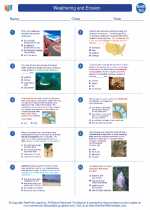
 Worksheet/Answer key
Worksheet/Answer key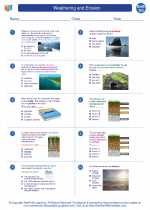
 Worksheet/Answer key
Worksheet/Answer key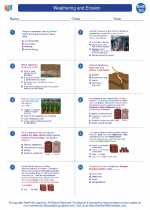
 Vocabulary/Answer key
Vocabulary/Answer key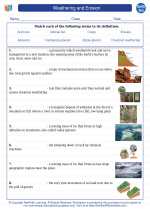
 Vocabulary/Answer key
Vocabulary/Answer key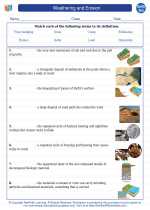
 Vocabulary/Answer key
Vocabulary/Answer key